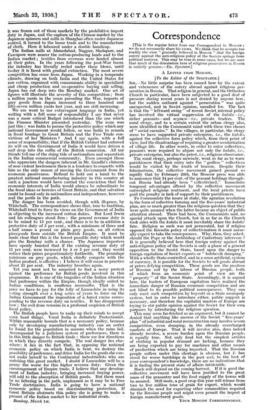Correspondence
[This is the regular letter from our Correspondent in Moscow ; we do not necessarily share his views. We think that he accepts too readily the view " generally believed in Moscow " that the foreign outcry against the anti-religious policy of the Soviets springs from political motives. This may be true in some cases, but we are sure that much of the detestation here of religious persecution in Russia is entirely genuine.—En. Spectator.]
A LETTER FROM MOSCOW.
[To the Editor of the SPECTATOR.] SIR,—NO little surprise has been caused here by the extent and vehemence of the outcry abroad against religious per-. secution in Russia. That religion in general, and the Orthodox Church in particular, have been subjected to a good deal of pressure during recent years -is not denied by anyone here, but the sudden outburst against " persecution " was quite unexpected, and in Soviet opinion, uncalled for. The fact is that the " leftward swing " of recent Soviet,internal policy has involved the virtual suppression of the kulaks—i.e., richer peasants—and neptnen—i.e., private traders. The rural clergy, and to a certain extent the urban clergy also, were identified in the Communist mind with these two classes of " social enemies." In the villages, in particular, the clergy seem to have supported private enterprise, i.e., the kulakt, against the collective farm policy which, from their point of , view, had the disadvantage of requiring a greater secularization of village life. In other words, in order to enter collectives, peasants were required to abjure not only the ktdaks, i.e., private enterprise, but also the priest, i.e., religious observance. The.rural clergy, perhaps unwisely, went so far as to warn parishioners that their entry into the "godless " collectives would be visited by the wrath of heaven. Despite their, fulminations, the collective movement gained ground so rapidly that by February 20th, the Moscow press was able to announce that 54 per cent. of the peasant holdings through- out Russia had already been " collectivized.' Immediate temporal advantages offered by the collective movement outweighed religious sentiment, and the local priests have paid the penalty in lack of support by their parishioners. To Communists the issues at stake, the agrarian revolution
in the form of collective fanning and the five-years' industrial plan, are so much greater than the religious question that they were quite amazed when the latter became an object of public attention. abroad. There had been, the Communists said, no special attack upon the Church, but in so far as the Church took skies with the kaiaks it must inevitably share the kaiaks' fate. Religion as such was not persecuted, but if religion opposed the Kremlin policy of collectivization it must natur- ally expect to take the consequences. Why, then, they asked, should the Pope or the Archbishop of Canterbury intervene Y It is generally believed here that foreign outcry against the anti-religious policy of the Soviets is only a phase of a general opposition to the Soviet State, based upon the danger to foreign capitalism of Soviet exports or " boLshevik dumping." With a wholly State-controlled, and in a sense artificial, system of currency, it is possible for the Soviets to sell goods abroad at prices defying competition. These goods are the produce of Russian soil by the labour -of Mission people, both of which from an economic point of view are the " property " of the Soviet State. Accordingly, it is argued here, the leaders of European capitalism have realized the immediate danger of Russian economic competition and are not blind to its possible political consequences. They can only meet such competition by boycott or a State monopoly system, but in order to introduce either, public support is necessary, and therefore the capitalist masters of Europe are trying to stir public opinion against the Soviet for their own purposes by introducing the religious question.
This may seem far-fetched as an argument, but it cannot be denied that anything like success of the Soviet " five-years' plan " of industrial and rural reconstruction may involve severe competition, even dumping, in the already overcharged markets of Europe. That it will involve also, does indeed already involve, a severe burden upon the Russian people, is equally true. Not only food but the simplest articles of clothing in popular demand are lacking, because they are being exported to pay for machines and other means of production which are being imported. That the Russian people suffers under this :shortage is obvious, but it has stood far worse hardships in the past and, to the best of your correspondent's knowledge, there are no indications that it is finding the present state of affairs intolerable. Much will depend on the coming harvest. If it is good the collective movement will have been justified to the great mass of the peasantry and the food. supply of the towns will be assured: Still more, a good crop this year will release from two to five million tons of grain for export, which would diminish the need for exporting other commodities required by the Russian people and might even permit the import of foreign manufactured goods. Vona Moscow CORRESPONDENT.


















































 Previous page
Previous page